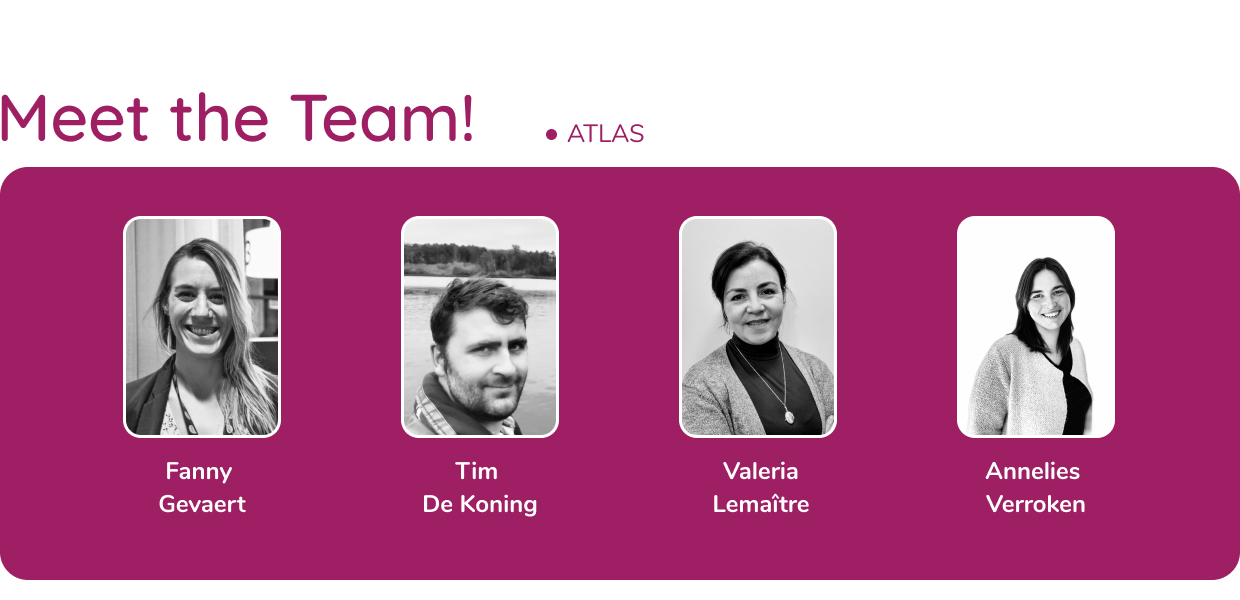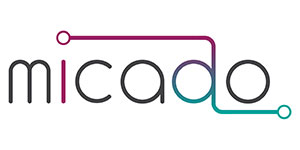
29 Jan Meet the Team – ATLAS
The next team we interviewed for our Meet the Team section is the ATLAS team, composed by Valeria Lemaître, Annelies Verroken, Tim De Koning and Fanny Gevaert.
Atlas, integratie en Inburgering Antwerpen is an autonomous agency responsible for carrying out the Flemish integration policy on behalf of and for the City of Antwerp.
Atlas is responsible for organising the Flemish programme of social and civic integration. The program offers basic Dutch language courses, a social orientation course and individual counselling. The program is provided to migrants in more than 30 languages.
Atlas also offers several services for newcomers and for non-native Dutch speakers in general, such as information about learning and practicing Dutch, assistance with the enrolment process for Dutch courses; advice and assistance to parents for finding and enrolling their children in a school; information about leisure time activities, etc. Our goal is to help migrants to get a better insight in and information about the life in Belgium, to give them tools to integrate and to actively participate in Belgian society.
In addition to Atlas’ extensive experience working with newcomers/no-native speakers, it also assists Antwerp’s public and non-profit organisations with information, training, and counselling on integration, ethnic-cultural and multilingualism
We have currently a team of 4 people working on the Micado project
Firstly, tell us a bit about the work you do at atlas.
Valeria: I hold two different job positions. As a Project Officer within the cell Finances & Innovation, I ensure that Atlas’ projects are managed and carried out in compliance with our internal procedures and with those of financing institutions. I give advice and support to project managers and I monitor opportunities for new projects. For MICADO I am the contact person/coordinator of the project within our organisation.
Tim: Like Valeria I hold two job positions. In 2019 Atlas chose to further embed the theme e-inclusion in a broader digital strategy for our organisation, I am responsible for its development and implementation, and for ensuring the complementarity of new and on-going projects related to digital inclusion. For the MICADO project, I am responsible for the coordination of the pilot implementation in the city of Antwerp, this means coordinating not only Atlas work but also the actions of our Antwerp local group regarding the pilot.
Fanny: In the past two years I have led the project “e-inclusion”. In this project, we identified newcomers’ needs and we looked for suitable tools and techniques at each stage of the integration programme for helping newcomers to develop their digital skills. The project also involved appropriate training and support to our staff, and participating in several groups/ networks of other public and non-profit organisations working on this field. In October 2020 I joined the MICADO team to work on the production of content and in the coming months on the user tests.
Annelies: In 2015, Atlas made a choice to work on digital inclusion. At that point, Atlas started to realize the digital divide was a real challenge and even a barrier for many migrants. I guided several experiments to find out how Atlas could help them to overcome these challenges and instead use digital tools to their own advantage, to facilitate their social participation and integration process. Between 2017 and 2018 I coordinated the development of the app “Welkom in Antwerpen” for newcomers. Since December 2020 I have been working with the MICADO team, testing and providing feedback to the technical team on the MICADO tool under development, and in the next months I will be working on the piloting phase, providing support during the user tests.
What was your motivation to developing/working in the MICADO project?
Valeria: I have been involved in the project since the proposal preparation. When we first heard about MICADO we found that there were relations with other on-going projects such as de app Welkom in Antwerpen that we had been developing at that time. Besides, MICADO was a great opportunity for exploring options/tools for centralising and sharing data on migrants with our local partners.
Tim: It is in Atlas’ DNA to work on digital tools for ensuring better integration. The great thing about this project is that it draws examples from Europe. As a result, other countries can learn things from us or we can learn things from them.
Annelies en Fanny: Micado complements very well the two projects that we both have been working on in the past years (e-inclusion project and the App Welkom in Antwerp). We have gained a lot of experience and knowledge that we can now apply in MICADO. We are eager to explore how to eventually upgrade or integrate the Welkom in Antwerpen App within the MICADO tool and gain experience with the production and management of multilingual content in such tools.
What do you think are the main challenges you will encounter during the MICADO project implementation?
Valeria: The success of Micado does not only depend on the organisations currently working on the project. To feed Micado with relevant and up-to-date information we need the cooperation and commitment of the organisations that serve this target group. One of the challenges will be to demonstrate and convince these organisations, which may have different priorities or few resources, about the advantages of Micado to secure their collaboration to feed/maintain and use the tool.
Tim: The project is ambitious; there is no doubt about that. I find it challenging to work in projects with several organisations at local/national level. In Micado we are with 18 organisations in 5 countries. This is one of the most interesting aspects of Micado, as it allows learning and exchanging experiences and ideas in a multidisciplinary and international team.
Annelies: Micado is not providing just one tool, it contains three tools in one that have to be compatible to one another and each has to be user friendly for its particular users. Micado has the ambition to be an innovative and leading example in digital solutions for migrants. Thus, the challenges in technical development and design are not to be underestimated.
Fanny: Regarding the production of information for the newcomers: finding a balance between detailed but at the same time clear texts. The harmonisation and quality of the different linguistic versions of each piece of information. The Covid-pandemics will bring specific challenges, for example when conducting the user testing sessions that we had planned for the piloting phase.
What do you hope to achieve by the end of the project?
In Antwerp, we have already made good progress thanks to the e-inclusion projects and the app Welcome to Antwerp. At Atlas we hope that MICADO will deliver an innovative & tested prototype that reflects the strengths of all partners involved in its development. A tool that facilitates information sharing, communication with migrants and between all the stakeholders. And hopefully an approach/prototype that can be out rolled to other cities and/or further developed at regional/national level.
What do you personally find most interesting/exciting about the project?
Valeria: Working with a multidisciplinary and international team, and the innovation aspect of the project.
Tim: Three things stand out. Certainly the level of ambition. But just as important is the active and continuous bringing together of expertise from the academic world, the IT world, public authorities and actors from the field of integration. And finally, the decentralised work is very interesting. This means that you have to actively engage in other forms of discussion and cooperation.
Fanny: After leading an e-inclusion project for two years, I can admit that I have become fascinated by this topic. I strongly believe in the opportunities that the Micado tool will bring for strengthening newcomers’ digital skills.
Annelies: This is a challenging project that goes way beyond Atlas, Antwerp or Belgium. It is exciting to take a step back from what we know, have a wider scope and work towards an outcome that will eventually support so many people in their integration process.
